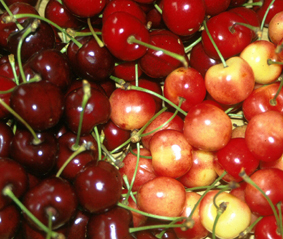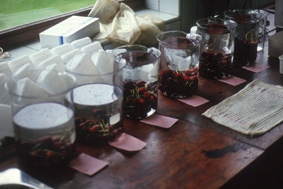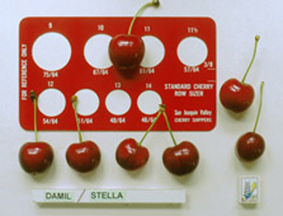Context
Cherries are very attractive for the consumer: their colour variation from yellow to purple red and even black but also their firmness or softness are never deceptive. Cherries are always tastefull. Choosing early or late one’s, they could be eaten during some 8 weeks. [image] The main criterias of breeding programs essentially deal with the fruit size, the intensity of the flower set and the self pollination capacity but the optimal choice of varieties is much more complex in relation to numerous criterias to be taken in consideration. The vigor and the shape characteristics of varieties are needed to define the adequate management system and to adapt the plantation density in the orchard. Flowering and maturity dates, related to our climatic conditions, influence the choice of varieties according to spring frost risks, and to the display of the fruits harvest. The fertility of the cultivar, its fruit set earlyness, the yield, the size and the quality of its fruits are the main criterias of the production success. All works must also be achieved in the respect of norms and conventions concerning the variety patent system.Objectives
As national varieties are limited in number and by commercial value, the objective of this project was and is always to identify, among the new cherry varieties proposed regularly by the different world breeders, those that possess technical, commercial and flavour characteristics corresponding adequately to Belgian soil and climate conditions. All varieties are budded on Damil® rootstock and planted in 3 replicates in the assessment orchard. Features of vegetative growth are measured annually: -growth, branching intensity and angle, health status, -density of May clusters, date of flower set, dates of flowering,… Since the first fruit set begins the fruit characteristics measurements: -earlyness of fruit set, date of harvest, -yield per tree, colour and mean weight of the fruit, -sensitivity to rots,… In the laboratory, other particular measurements are achieved on a production sample of each tree: -colour of the flesh and juice, - peduncle length and core volume, - sugar content of juice measured by refractometry, - fruit firmness tested by penetrometry, - fruit cracking index by the Christensen test.Expected results
With the progression of annual observations and measurements, new variety files are regularly published. They are added to the already published index and sent to holders of a previous edition index. Every variety is maintained in the conservatory orchard in order to constitute reference trees. These are needed to develop an identity certification scheme (GI), based on morpho-biological characteristics or molecular markers confrontation possibilities. Virological status (VF) of the most interesting varieties for the Belgian market is also checked. If needed, eradication thermotherapic and/or meristematic treatments are applied. These varieties could be then delivered to professionals through official wood parks.Results obtained
More than 160 varieties have been progressively tested in our conditions. Those varieties originate from Europe (France, Germany, TheNetherlands, Italy, Czech Republic, Hungary,…), of America (Canada, USA) and of other parts of the World (Australia,…). Various classifications carrying on 147 different varieties were published. They concern the accumulated production, the mean fruit weight, the cracking index, the firmness and the sugar content. Early varieties, presenting a high floral induction and big sized fruits are interesting on Damil® rootstock. Others could require a longer initial vegetation period to induce a satisfying production level. 13 commercial varieties among the most adapted to our climatic conditions are proposed to professionals: from early to late maturity date, Burlat, Celeste®, Hartland®, Stella, Kordia, Sunburst, Summit, Gemersdorfi 3, Norwunder, Sylvia, Regina, Lapins, S-13-49-24®. [image] A particularly interesting variety list for the amateur, having a good yield and a weak sensitivity to fruits rots, is also proposed: from early to late maturity, Helshoven, Annabella, Sam, Ulster, Star, Castor, Kordia, Ghijsens Seedling, and Regina.Funding
- CRA-W - Walloon Agricultural Research Centre
Publications
Magein, H. & Mahoux, A. (2007). 15 nouvelles fiches variétales.. La cerise en verger intensif. Gembloux, Ed. CRA-W, Département Biotechnologie.
Magein, H. & Mahoux, A. (2008). 19 nouvelles fiches variétales.. La cerise en verger intensif. Gembloux, Ed. CRA-W, Département Biotechnologie.
Magein, H. , Mahoux, A. & Druart, P. (2000). 20 nouvelles fiches variétales.. La cerise en verger intensif. Gembloux, Ed. CRA-W, Département Biotechnologie.
Magein, H. (2008). Variétés de cerisier: 34 nouvelles fiches descriptives éditées CRAW-Info 18, 3.


